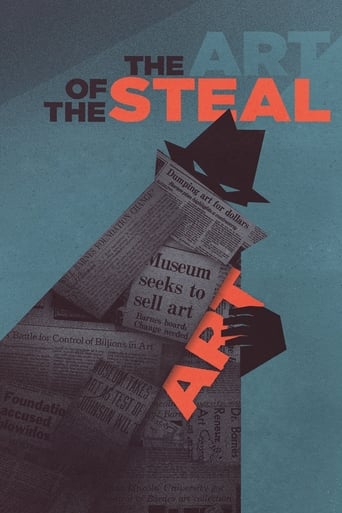



Good idea lost in the noise
Beautiful, moving film.
The film makes a home in your brain and the only cure is to see it again.
View MoreI enjoyed watching this film and would recommend other to give it a try , (as I am) but this movie, although enjoyable to watch due to the better than average acting fails to add anything new to its storyline that is all too familiar to these types of movies.
View MoreIn 1922, Albert Barnes created the Barnes Foundation outside of Philadelphia to house his collection of post-impressionist and early modern art. In 2007, the $Billions collection was 'stolen' from its Lower Merion location to downtown Philadelphia with the need for high-end art for public consumption, crocked politicians, money-hungry non-profits, and big moneyed establishment. Barnes had made his fortune creating a cure. He hated the conservative establishment in Philadelphia and collected great modern artists in Paris when they were dismissed by the art world. His collection was initially attacked by art critics. Then he was criticized for not showing the collection enough. He got into a life-long fight with Philadelphia Inquirer's owners tax-evading Moses Annenberg and Nixonian son Walter. After Barnes' death in 1951, it begins a long running battle to gain control of the foundation. This is very informative and more insightful than most fictional movies. It also proves that the good guys don't always win and money talks. It's a great if one-sided investigative documentary.
View More"The Art of the Steal" is about not only the greatest art theft in the world, but probably the greatest crime ever committed. And at this point, let's define "greatest". In this sense, "great" means comparatively large in size or number, unusual or considerable in power or intensity, and of an extreme or notable degree. It does not mean wonderful, first-rate, or good. This theft wasn't even deemed a crime in the first place and was committed by mobsters, city of Philadelphia politicians, and educators.The documentary follows the story chronologically. It starts with Dr. Albert C. Barnes' educating himself about art and building an immense art collection. He's a good guy. He wanted to appreciate art for art's sake, not for its perceived value. He started the Barnes Foundation, complete with approximately $30 Billion dollars worth of art work by some of the world's most eminent painters. And, yes, that's Billion with a "B". The legal articles of incorporation for the Barnes Foundation made it very clear that this was a private, educational institution. Art students were encouraged to sign-up for classes or a visit. The "fat cats" of Philadelphia were not. The next part of the documentary was Barnes' death in 1951. It makes you gasp if you think about what could happen to the Foundation if he didn't adequately prepare for its life after his death. The story kept weaving its way through twist after twist and for somebody who is completely uneducated in art history, each point was more shocking than the one before.The good news is that Barnes' did adequately prepare the Foundation in the event of his death. He had a legal Will and Testament firmly in place. It was first left to his trusted friend, Violette de Mazia, and she did the best she could. Even in the event of her death, which happened in 1988, Barnes still had the legal ownership of the Foundation intact. The bad news is that greedy, manipulative people in power do not have to follow legal documents. To them the legal system is this little joke which they can just look down on and laugh at as they proceed to do the opposite of what was supposed to happen – legally and morally speaking that is."The Art of the Steal" is a great documentary because they even managed to get people like "educator" Richard Glanton, the Governor of Pennsylvania, the Mayor of Philadelpha, and a corrupt judge to speak in front of the camera admitting to what they did, in direct opposition to the law, completely nonchalant to their immoral actions. And the world just has to sit back and watch them commit the greatest crime ever.
View MoreThe scenario in brief: Albert C. Barnes is an idiosyncratic, but very wealthy man who has a good eye for art in the early 20th century and manages to snap up a large collection of post-impressionist paintings that becomes very important. Instead of opening this up to public view, he hides it away in a suburb on Pennsylvania, accessible only to a select elite. If we are to believe this documentary, his act of cultural kidnapping was founded on personal animosity towards the eminences running the public works in Pennsylvania in his day. Hardly an excellent reason to deprive the nation of the opportunity to view great works of art.But Barnes is not content with depriving his contemporaneous generation of these works and decides to drag his collection with him to the grave. He draws up an elaborate will that sets up a foundation that will keep the paintings sequestered away, mouldering under the gaze of small groups of specially-selected 'students'.The film covers the efforts made to wrest control of this vitally important collection away from a group of preppy blue-bloods who wanted to remain true to Barnes' exclusive vision. We are shown a series of sniffy elitist aristos whining as the barriers that Barnes set up are slowly broken down. We are told, in shocked tones, that one common gent decided to leave the exhibition after remarking that Reubens' paintings contained a lot of fat ladies (gasp! - the implication is clearly that mere commoners should not be allowed to view and pass judgement on these cultural fetishes).Finally, the Foundation teeters on bankruptcy and elected officials step in to ensure that the collection is maintained for the public good. In a final act of cultural vandalism they move it away from the tiny and vastly inappropriate secluded mansion Barnes provided and house it in a modern gallery where anyone can visit and enjoy these treasures. At this point the chosen talking heads erupt in a fury - the idea of common people leaving the imprint of their common eyeballs on work that should be restricted to the privileged elite is clearly beyond bearing.Make no mistake, the intent of this film is to argue the case for the Barnes elitists, and it spends a lot of time spewing rants about how evil it was to open up the collection. I knew very little of the Barnes Foundation before seeing it, but based solely on the information the film provided it is blatantly obvious that the terms of Barnes' legacy had to be overthrown.This art did not belong to Barnes, he only got to hold it for a while. This art belongs to the world, and the world finally has the chance to enjoy it.
View MoreThe BS factor being bandied around by buff-29 and R.D. Monsoon in their reviews are mostly refuted simply by watching the movie. Just 2 of their points, Monsoon's assertion that the Foundation was mismanaged by the Foundation Board is completely misrepresented - it was purposely run into the ground by the packing of new board members who represented the push to move the collection to Philly. Secondly, Buff-29 makes a big deal about the filmmakers using "Dr." as Barnes' title......well guess what Mr. 29, Barnes got an MD degree in 1892, why should he be denied his title when every doctor on earth uses the title until the day they die! Saying this use makes the movie dishonest is simply an attempt to distract potential viewers from the real points the movie makes - truthful points I might add? Actually the major points the movie makes can't be denied - the collection which legally belonged to the foundation set up by Barnes was stolen by new board members using audacious, dishonest behavior and motives and by overwhelming the small town keepers-of-the-collection-flame with armies of lawyers, politicians, lies and money! In overturning the Foundation Charter AND Barnes' will these scuzzballs have set a legal precedent that will come back to bite the @sses of US foundations, private and public institution boards, museums, schools and virtually any bequest currently in use by those entities anywhere in this country. But hey, Philly got it's tourist attraction....no big deal huh? My guess is that sooner or later Bernie Watson, Ed Rendell, Rebecca Rimel, Mayor Street and all of their handmaidens will get personally burnt by the precedent they set. After all, what if the MoMA decides the Barnes collection belongs in Manhattan (after all it would make more money there, be seen by many more people and NOT be in Philly where Barnes specifically NEVER wanted it to be)? Think Philly could withstand the onslaught of power and money that institution could generate? I think not! Heck, while we're at it let's move the Frick to Orlando where it will get many more visitors sitting next to DisneyWorld.
View More